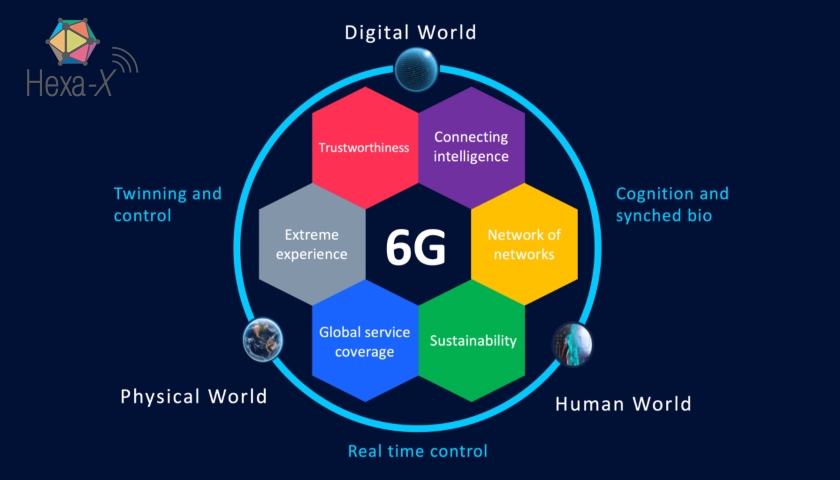Nokia leads the way in the next generation of wireless networks as the overall project leader for Hexa-X, the European Commission’s 6G flagship initiative for research that will drive the overall 6G vision. The project goals include creating unique 6G use cases and scenarios, developing fundamental 6G technologies and defining a new architecture for an intelligent fabric that integrates key 6G technology enablers.
![]() The Hexa-X project has been awarded funding from the European Commission under the European Union’s Horizon 2020 research and innovation program, a significant step toward bringing together key industry stakeholders in Europe to take the lead in advancing 6G. The stakeholders represent the full value-chain of future connectivity solutions ranging from network vendors, communication service providers, verticals, and technology providers, as well as the most prominent European communications research institutes.
The Hexa-X project has been awarded funding from the European Commission under the European Union’s Horizon 2020 research and innovation program, a significant step toward bringing together key industry stakeholders in Europe to take the lead in advancing 6G. The stakeholders represent the full value-chain of future connectivity solutions ranging from network vendors, communication service providers, verticals, and technology providers, as well as the most prominent European communications research institutes.
With Nokia taking the lead, the Hexa-X project aims to connect the physical, digital and human worlds, firmly anchored in future wireless technology and architectural research. Wireless technologies are critical for society and the economy today and their importance will continue to steadily increase with 5G and its evolution, enabling new ecosystems and services.
Nokia has been at the forefront in commercializing every generation of wireless technology, from the first GSM call to the best performing 4G networks and the world’s fastest 5G speeds. Nokia Bell Labs, the world-renowned industrial research arm of Nokia, pioneered many of the fundamental technology innovations that are being used to develop 5G standards. These include Massive MIMO, mmWave access, coding, and 5G radio stack design, which enabled 3GPP Release 15 initial deployments. Nokia Bell Labs is also developing enablers for the upcoming 3GPP Release 16 and 17 that are key for the digital transformation of industrial verticals, such as 5G New Radio (NR) in unlicensed spectrum bands, NR-Light to support massive IoT with medium-rate sensors and localization.
Building on this strong heritage, Nokia is leading the 6G joint research and pre-standardization process and Nokia Bell Labs is already researching the fundamental technologies that will comprise 6G. Nokia expects 6G systems to launch commercially by 2030, following the typical 10-year cycle between generations.
Peter Vetter, Head of Access and Devices Research, Nokia Bell Labs, said: “Even though there is still a lot of innovation in 5G with the release of new standards, we are already exploring 6G in our research lab. In the 6G era we will see applications that will not only connect humans with machines but also connect humans with the digital world. Such a secure and private connection can be used for preventive healthcare or even to create a 6G network with a sixth sense that intuitively understands our intentions, making our interactions with the physical world more effective and anticipating our needs, thereby improving our productivity.”
Nokia Bell Labs, together with the Hexa-X consortium, has identified six research challenges that need to be addressed to lay the technical foundation for 6G wireless systems:
- Connecting intelligence: AI/Machine Learning (ML) technologies need to be a vital and trusted tool for significantly improved efficiency and service experience, serving humans
- Network of networks: multiple types of resources need to be aggregated to create a digital ecosystem that grows more and more capable, intelligent, and heterogeneous, eventually creating a single network of networks
- Sustainability: energy-optimized digital infrastructure for a reduced global ICT environmental footprint, as well as delivering effective and sustainable digitization tools for global industry, society and policymakers
- Global service coverage: efficient and affordable solutions for global service coverage, connecting remote places
- Extreme experience: extreme bitrates, extremely low (imperceptible) latencies, seemingly infinite capacity, and precision localization and sensing
- Trustworthiness: ensuring the confidentiality and integrity of communications and delivering data privacy, operational resilience and security
In addition to Hexa-X, Nokia is actively involved in other European 6G research initiatives such as 6Genesis, a national 6G program funded by the Academy of Finland and led by the University of Oulu, and Horizon Europe Smart Networks and Services, which aims to secure European leadership for the development and deployment of next generation network technologies and services, while accelerating European industry digitization.
The Hexa-X project starts on 1 January 2021, with a planned duration of 2.5 years. Nokia is the project lead for Hexa-X, working closely with a strong consortium of European partners.
Picture: hexa-x.eu





